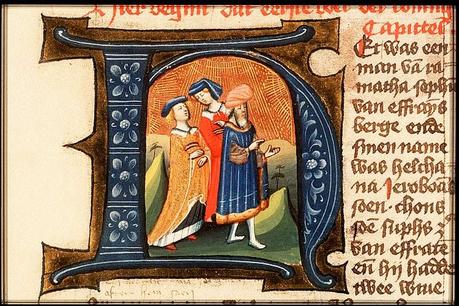Polygamy was started by Lamech, son of Methuselah and father to Noah. The world was so corrupt in Genesis 4 that Lamech's two wives, Adah and Zillah I'm sure were a bundle of envies and jealousies too. We know that Rachel was jealous of her sister Leah (Genesis 30:1). Two or more wives for one man at the same time is not God's will.
In Hannah's case we read that indeed Peninnah was torturing Hannah because Hannah had not produced a child. In the days of the Hebrews, it was tantamount to keep the race going and to keep it ethnically pure. Hannah had failed at what women were supposed to do, bear progeny. What Hannah did not know is that God closed her womb. (1 Samuel 1:5). God had a purpose in mind. Anyway, Peninnah had been successful at giving Elkanah an heir, and she never let Hannah forget it.
He had two wives. The name of the one was Hannah, and the name of the other, Peninnah. And Peninnah had children, but Hannah had no children. (1 Samuel 1:2)

Hannah was barren, for the LORD had closed her womb. CC photo
Now see this:
And her rival used to provoke her grievously to irritate her, because the Lord had closed her womb. So it went on year by year. As often as she went up to the house of the Lord, she used to provoke her. Therefore Hannah wept and would not eat. (1 Samuel 1:6-7)
Look at the words provoke, grievously, and irritate. The word for 'irritate' is a denominative verb from raam meaning thunder, or roar). Remember this. Peninnah 'thundered'. It seems there was a lot of sinning on Peninnah's part and it certainly must have been a stress for Hannah to live under those conditions.
It's like, but worse than when you go to Thanksgiving at your mother-in-law's house, and you know your cousin will be there, and she always lobs those loaded barbs at you.
"That's a nice outfit, for the selections available in your size."
"Your daughter seems to be doing well at her piano lessons, though Julliard is obviously out of the question."
"Now that we're moving to our new house, be sure to visit us, it won't be as cramped as when we come to your house."
"It's so nice you're not embarrassed driving a big car in these days of expensive gas."
The Thanksgiving meal seems like it'll go on forever with all the provocations coming out her mouth. All you want to do after ten minutes is throw the gravy at her. Hannah's provocations were worse because they were intentional with malice. Peninnah was loud and proud about her provocations. They struck at Hannah's very womanhood, and raison d'etre of a woman in those days. They cast salt on a wound, for what woman who wants children isn't mournful when she doesn't have them. Peninnah heaping salt on the wound was just insensitive and hard-hearted. Peninnah must have made life very hard for Hannah. This went on every day, "year by year."

Alma-Tadem, Unconscious Rivals 1893
As we see how upset Hannah was-
Therefore Hannah wept and would not eat. (1 Samuel 1:7b)
She was deeply distressed and prayed to the Lord and wept bitterly. (1 Samuel 1:10)
But Hannah had a choice.
--She could succumb to Peninnah's level and lob some barbs back,
--She could become demanding like Rachel did in the face of Leah's fruitful child-bearing,
"When Rachel saw that she bore Jacob no children, she envied her sister. She said to Jacob, “Give me children, or I shall die!" (Genesis 30:1).
Note Jacob's response to Rachel in the next verse, "Jacob’s anger was kindled against Rachel, and he said, “Am I in the place of God, who has withheld from you the fruit of the womb?" (Genesis 30:2)
Becoming demanding and angry and petulant only perpetuates anger and strife in the home. Elkanah remained loving and supportive of his wife Hannah. Hannah gave Elkanah no cause to kindle his anger against her.
Elkanah loved Hannah so much. 1 Samuel 1:5 says "But to Hannah he gave a double portion, because he loved her, though the LORD had closed her womb."
Elkanah was publicly showing his love for Hannah by giving her the best portion, double, to illustrate to one and all that though she bore no children, he loved her anyway, and loved her best. Would he have loved her if she had succumbed to bitterness and rivalry with Peninnah, trading barbs and making more strife in the home? Hard to say. But Hannah's attitude of obedience the LORD and love for her husband went a long way to maintaining a loving relationship with both her husband and her God.
So Hannah did not succumb to the temptation to rival Peninnah back. Instead, she did what she did,
--seek the LORD,
--remain humble,
--love her husband
Ultimately the LORD rewarded Hannah, not Peninnah. Though Peninnah was given children first, and after a while Hannah was too, Hannah's child became Samuel, the great prophet of God and Judge of Israel.
But Hannah’s patience, self-control and intercession prevailed and she became the mother of Samuel who was “more than a prophet” SourceHannah's patience, forbearance, loving and submissive attitude is pleasing to God. God heard Hannah's prayer and answered it.
Hannah prayed a beautiful prayer of thanks to the LORD. It is long and sensitive and humble. In verse 10, you note Hannah said the following:
The adversaries of the LORD shall be broken to pieces; against them he will thunder in heaven. The LORD will judge the ends of the earth; he will give strength to his king and exalt the horn of his anointed.” (1 Samuel 2:10)
Remember above, Peninnah thundered against her rival, Hannah? Well, all the while God thundered against Peninnah from heaven! Yes, the word 'thunder' in Penninah's verse and in Hannah's thanksgiving verse are the same, raam.

Illuminated manuscript of Elkanah and his two wives, c.1430
Whatever you are going through, God knows, He hears, He sees, and He remembers. He thunders at our rivals in heaven. Our job is to remain submissive to His will, be loving to our family and friends and even our rivals. We should pray like Hannah did. Whether we pray bitterly or we pray joyfully like Hannah did, she prayed honestly. She poured herself out before the LORD and sought Him at all times.
Stay strong! In Hannah's case she was strong in devotion to God. She continued to love her God, her husband, and her life. She was unhappy, but the more she was unhappy, the more she sought God. It's hard to stay loving when you're sad, heartbroken, and bitter. But Hannah remained consistent in her attitude. That's strong.
O, take heart! Your rival will come to naught, our God hears! He thunders against our enemies, He loves His children.
For the director of music. A psalm of David. The king rejoices in your strength, LORD. How great is his joy in the victories you give! (Psalm 21:1)
